Unit 7 Food festival Topic 2 I’m not sure whether I can cook it well Section C授课课件
文档属性
| 名称 | Unit 7 Food festival Topic 2 I’m not sure whether I can cook it well Section C授课课件 | 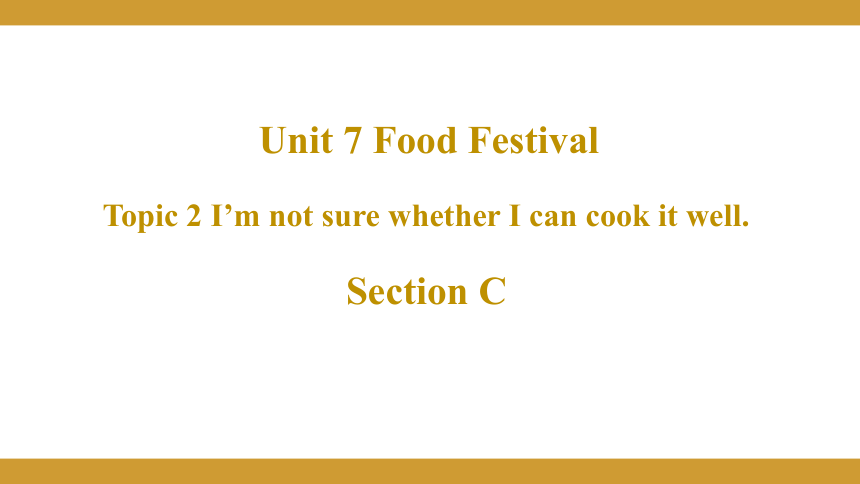 | |
| 格式 | pptx | ||
| 文件大小 | 11.5MB | ||
| 资源类型 | 试卷 | ||
| 版本资源 | 仁爱科普版 | ||
| 科目 | 英语 | ||
| 更新时间 | 2022-12-26 07:33:04 | ||
图片预览

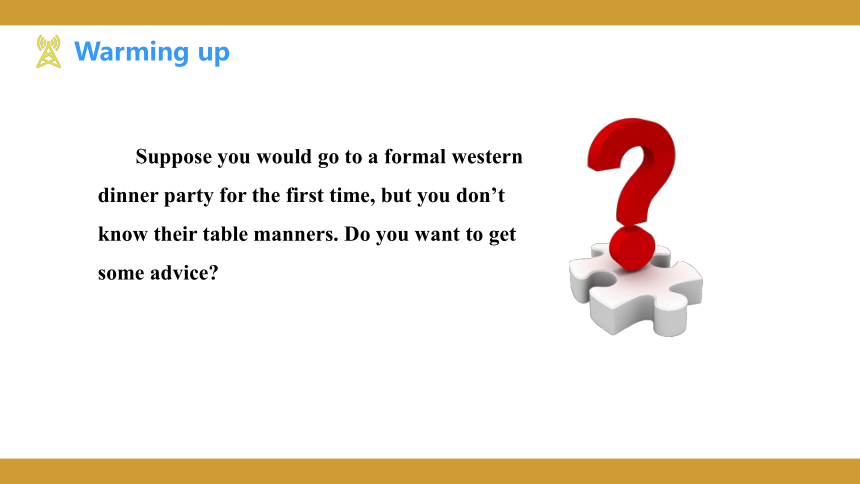
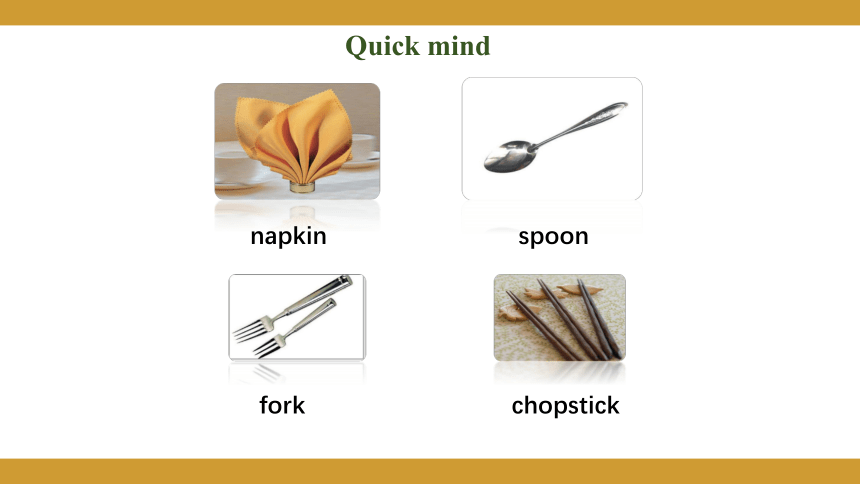
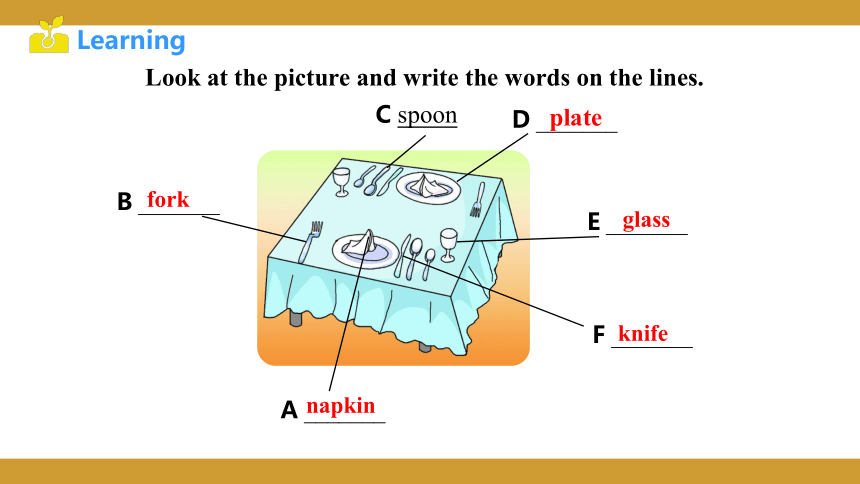
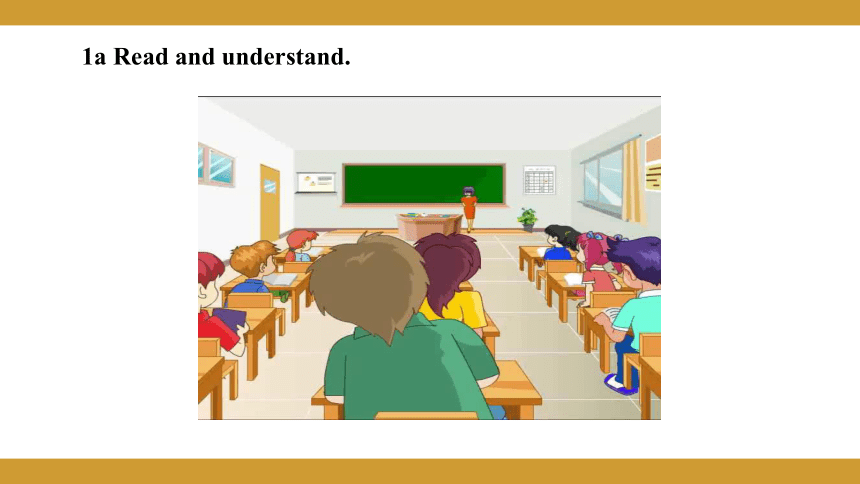
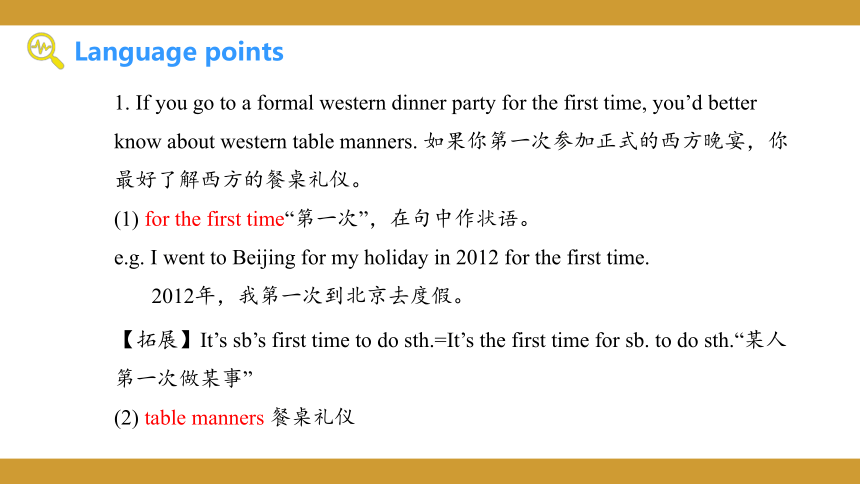
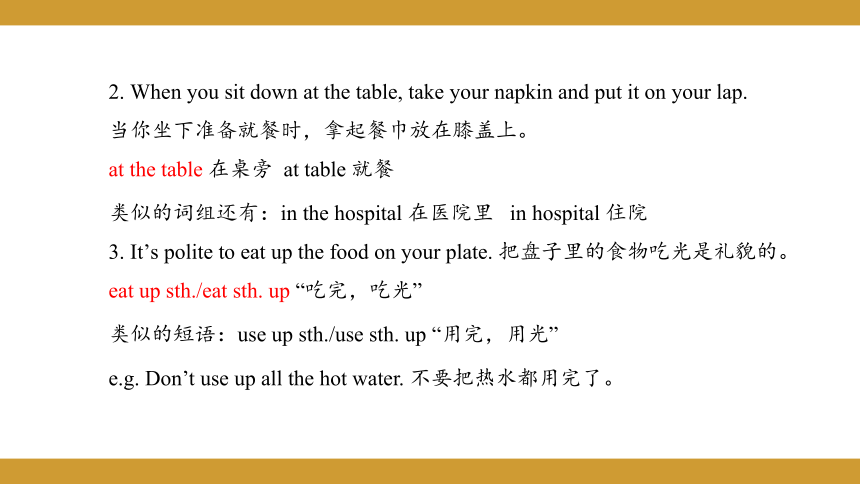
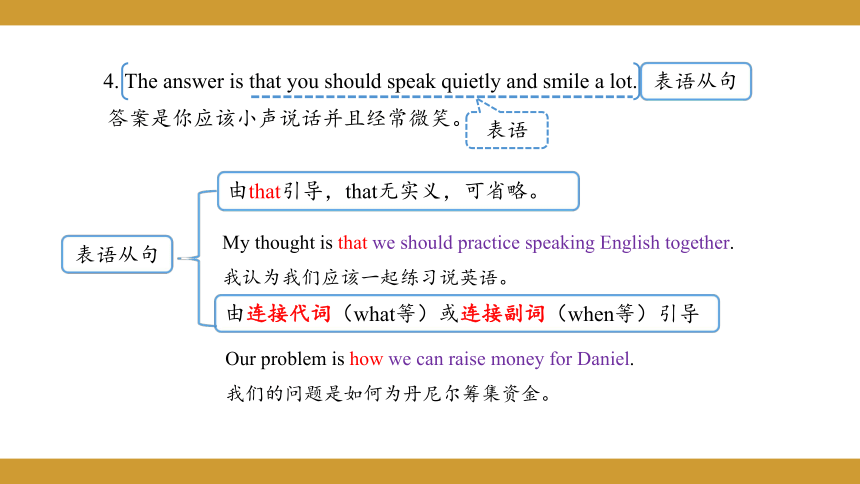
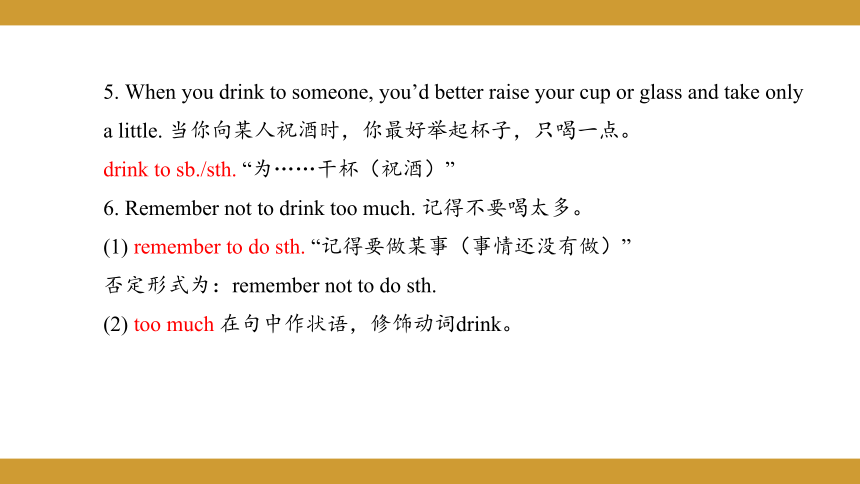
文档简介
(共20张PPT)
Section C
Unit 7 Food Festival
Topic 2 I’m not sure whether I can cook it well.
Suppose you would go to a formal western dinner party for the first time, but you don’t know their table manners. Do you want to get some advice
Warming up
spoon
fork
chopstick
napkin
Quick mind
A _______
B _______
C spoon
D _______
E _______
F _______
napkin
fork
plate
glass
knife
Look at the picture and write the words on the lines.
Learning
1a Read and understand.
1. If you go to a formal western dinner party for the first time, you’d better know about western table manners. 如果你第一次参加正式的西方晚宴,你最好了解西方的餐桌礼仪。
(1) for the first time“第一次”,在句中作状语。
e.g. I went to Beijing for my holiday in 2012 for the first time.
2012年,我第一次到北京去度假。
【拓展】It’s sb’s first time to do sth.=It’s the first time for sb. to do sth.“某人第一次做某事”
(2) table manners 餐桌礼仪
Language points
2. When you sit down at the table, take your napkin and put it on your lap.
当你坐下准备就餐时,拿起餐巾放在膝盖上。
at the table 在桌旁 at table 就餐
类似的词组还有:in the hospital 在医院里 in hospital 住院
3. It’s polite to eat up the food on your plate. 把盘子里的食物吃光是礼貌的。
eat up sth./eat sth. up “吃完,吃光”
类似的短语:use up sth./use sth. up “用完,用光”
e.g. Don’t use up all the hot water. 不要把热水都用完了。
答案是你应该小声说话并且经常微笑。
4. The answer is that you should speak quietly and smile a lot.
表语
Our problem is how we can raise money for Daniel.
我们的问题是如何为丹尼尔筹集资金。
表语从句
表语从句
由that引导,that无实义,可省略。
由连接代词(what等)或连接副词(when等)引导
My thought is that we should practice speaking English together.
我认为我们应该一起练习说英语。
5. When you drink to someone, you’d better raise your cup or glass and take only a little. 当你向某人祝酒时,你最好举起杯子,只喝一点。
drink to sb./sth. “为……干杯(祝酒)”
6. Remember not to drink too much. 记得不要喝太多。
(1) remember to do sth. “记得要做某事(事情还没有做)”
否定形式为:remember not to do sth.
(2) too much 在句中作状语,修饰动词drink。
1. When you start dining, you should take your napkin first and put it on your lap.
2. At the table, people always keep the fork in their left hands.
3. It’s impolite to eat up the food on your plate.
4. It’s polite to speak loudly and smile a lot.
5. When you drink to someone, you should raise your glass and take only a little.
( )
( )
( )
( )
( )
T
F
F
F
T
1b Read 1a and mark T(true) or F (False).
1c Read 1a again and underline the key points about western table manners. Then work in groups and compare them with Chinese table manners.
When you sit down at the table, ...
The dinner always starts with …
You should keep the fork ...
If you use your knife, ...
Don’t take …
Don’t speak …
When you drink to someone, you’d better...
First, talk with your partner about western table manners.
Group work
Second, collect some information about table manners in China. Then talk about them.
You may use these sentences:
I think (that) it is polite to … in China.
I think (that) it is impolite to … in China.
A: Can you tell me if it’s polite to eat with your arms or elbows on the table in America
B: Yes, I can. It’s impolite.
A: Do you know whether or not it’s impolite to smoke during a meal in France
B: Yes, I do. It’s impolite.
A: We know people use a spoon and a fork to eat in Thailand. Do you know whether they use knives
B: Yes, I do. They don’t use them.
A: I know Indians eat with their right hands. I don’t know if there’s no need for knives, forks or chopsticks.
B: No, there’s no need.
2 Match the pictures with the conversations. Then practice in pairs.
A
B
C
D
C
D
A
B
3 Discuss eating customs in different countries, using object clauses.
Example:
Is it polite to point at people with chopsticks in China
A: I want to know whether/if it is polite to point at people with chopsticks in China.
B: I don’t think that it is polite to point at people with chopsticks in China.
1. Is it polite to eat soup very quietly in most African countries
2. Can people smoke during a meal in France
3. Will people leave as soon as they finish eating in western countries
4. Do Americans eat food like chicken legs with their fingers
5. Does a formal western dinner always start with a small dish
point at sb.指向某人
finish doing sth. 完成某事
quiet+ly—quietly adv. 安静地,寂静地
4 Write a short passage about table manners in China, using object clauses and the information you have collected in 1c.
Project
We learn:
1. Some new words:
formal, manner, napkin, lap, fork, dish, quietly, dine, elbow, spoon, chopstick, finger
2. Some phrases:
for the first time, eat up sth., table manners, drink to sb., remember to do sth. ,
point at, finish doing sth.
3. Object clauses with if/whether:
Can you tell me if it’s polite to eat with your arms or elbows on the table in America
Do you know whether it’s impolite to smoke during a meal in France
Summary
We can:
Talk about table manners for a formal western dinner party.
First, when you sit down at the table, take your napkin and put it on your lap.
You should keep the fork in your right hand.
It’s polite to eat up the food on your plate.
Don’t take more food than you need.
You should speak quietly and smile a lot.
When you drink to someone, you’d better raise your glass and take only a little.
Remember not to drink too much.
把下列句子合并成一个含有宾语从句的复合句
1. I don’t know. Is she a teacher
2. Do you know Is it good to watch TV too much
3. I don’t know. Is it polite to eat up the food on your plate
4. I’m not sure. Is he at home
5. I want to know. Will it rain tomorrow
Exercise
Homework
1. Collect more information about table manners in different countries.
2. Finish exercise of Unit 7 Topic 2 Section C.
3. Preview Section D of Unit 7 Topic 2.
Section C
Unit 7 Food Festival
Topic 2 I’m not sure whether I can cook it well.
Suppose you would go to a formal western dinner party for the first time, but you don’t know their table manners. Do you want to get some advice
Warming up
spoon
fork
chopstick
napkin
Quick mind
A _______
B _______
C spoon
D _______
E _______
F _______
napkin
fork
plate
glass
knife
Look at the picture and write the words on the lines.
Learning
1a Read and understand.
1. If you go to a formal western dinner party for the first time, you’d better know about western table manners. 如果你第一次参加正式的西方晚宴,你最好了解西方的餐桌礼仪。
(1) for the first time“第一次”,在句中作状语。
e.g. I went to Beijing for my holiday in 2012 for the first time.
2012年,我第一次到北京去度假。
【拓展】It’s sb’s first time to do sth.=It’s the first time for sb. to do sth.“某人第一次做某事”
(2) table manners 餐桌礼仪
Language points
2. When you sit down at the table, take your napkin and put it on your lap.
当你坐下准备就餐时,拿起餐巾放在膝盖上。
at the table 在桌旁 at table 就餐
类似的词组还有:in the hospital 在医院里 in hospital 住院
3. It’s polite to eat up the food on your plate. 把盘子里的食物吃光是礼貌的。
eat up sth./eat sth. up “吃完,吃光”
类似的短语:use up sth./use sth. up “用完,用光”
e.g. Don’t use up all the hot water. 不要把热水都用完了。
答案是你应该小声说话并且经常微笑。
4. The answer is that you should speak quietly and smile a lot.
表语
Our problem is how we can raise money for Daniel.
我们的问题是如何为丹尼尔筹集资金。
表语从句
表语从句
由that引导,that无实义,可省略。
由连接代词(what等)或连接副词(when等)引导
My thought is that we should practice speaking English together.
我认为我们应该一起练习说英语。
5. When you drink to someone, you’d better raise your cup or glass and take only a little. 当你向某人祝酒时,你最好举起杯子,只喝一点。
drink to sb./sth. “为……干杯(祝酒)”
6. Remember not to drink too much. 记得不要喝太多。
(1) remember to do sth. “记得要做某事(事情还没有做)”
否定形式为:remember not to do sth.
(2) too much 在句中作状语,修饰动词drink。
1. When you start dining, you should take your napkin first and put it on your lap.
2. At the table, people always keep the fork in their left hands.
3. It’s impolite to eat up the food on your plate.
4. It’s polite to speak loudly and smile a lot.
5. When you drink to someone, you should raise your glass and take only a little.
( )
( )
( )
( )
( )
T
F
F
F
T
1b Read 1a and mark T(true) or F (False).
1c Read 1a again and underline the key points about western table manners. Then work in groups and compare them with Chinese table manners.
When you sit down at the table, ...
The dinner always starts with …
You should keep the fork ...
If you use your knife, ...
Don’t take …
Don’t speak …
When you drink to someone, you’d better...
First, talk with your partner about western table manners.
Group work
Second, collect some information about table manners in China. Then talk about them.
You may use these sentences:
I think (that) it is polite to … in China.
I think (that) it is impolite to … in China.
A: Can you tell me if it’s polite to eat with your arms or elbows on the table in America
B: Yes, I can. It’s impolite.
A: Do you know whether or not it’s impolite to smoke during a meal in France
B: Yes, I do. It’s impolite.
A: We know people use a spoon and a fork to eat in Thailand. Do you know whether they use knives
B: Yes, I do. They don’t use them.
A: I know Indians eat with their right hands. I don’t know if there’s no need for knives, forks or chopsticks.
B: No, there’s no need.
2 Match the pictures with the conversations. Then practice in pairs.
A
B
C
D
C
D
A
B
3 Discuss eating customs in different countries, using object clauses.
Example:
Is it polite to point at people with chopsticks in China
A: I want to know whether/if it is polite to point at people with chopsticks in China.
B: I don’t think that it is polite to point at people with chopsticks in China.
1. Is it polite to eat soup very quietly in most African countries
2. Can people smoke during a meal in France
3. Will people leave as soon as they finish eating in western countries
4. Do Americans eat food like chicken legs with their fingers
5. Does a formal western dinner always start with a small dish
point at sb.指向某人
finish doing sth. 完成某事
quiet+ly—quietly adv. 安静地,寂静地
4 Write a short passage about table manners in China, using object clauses and the information you have collected in 1c.
Project
We learn:
1. Some new words:
formal, manner, napkin, lap, fork, dish, quietly, dine, elbow, spoon, chopstick, finger
2. Some phrases:
for the first time, eat up sth., table manners, drink to sb., remember to do sth. ,
point at, finish doing sth.
3. Object clauses with if/whether:
Can you tell me if it’s polite to eat with your arms or elbows on the table in America
Do you know whether it’s impolite to smoke during a meal in France
Summary
We can:
Talk about table manners for a formal western dinner party.
First, when you sit down at the table, take your napkin and put it on your lap.
You should keep the fork in your right hand.
It’s polite to eat up the food on your plate.
Don’t take more food than you need.
You should speak quietly and smile a lot.
When you drink to someone, you’d better raise your glass and take only a little.
Remember not to drink too much.
把下列句子合并成一个含有宾语从句的复合句
1. I don’t know. Is she a teacher
2. Do you know Is it good to watch TV too much
3. I don’t know. Is it polite to eat up the food on your plate
4. I’m not sure. Is he at home
5. I want to know. Will it rain tomorrow
Exercise
Homework
1. Collect more information about table manners in different countries.
2. Finish exercise of Unit 7 Topic 2 Section C.
3. Preview Section D of Unit 7 Topic 2.
同课章节目录
- Unit 5 Feeling excited
- Topic 1 You look excited
- Topic 2 I’m feeling better now.
- Topic 3 Many things can affect our feelings.
- Unit 6 Enjoying Cycling
- Topic 1 We're going on a three-day visit to Mount
- Topic 2 How about exploring Tian’anmen Square?
- Topic 3 Bicycle riding is good exercise.
- Unit 7 Food festival
- Topic 1 We’re preparing for a food festival.
- Topic 2 I’m not sure whether I can cook it well.
- Topic 3 I Cooked the Most Successfully
- Unit 8 Our Clothes
- Topic 1 We will have a class fashion show.
- Topic 2 We can design our own uniforms.
- Topic 3 He said the fashion show was wonderful.
